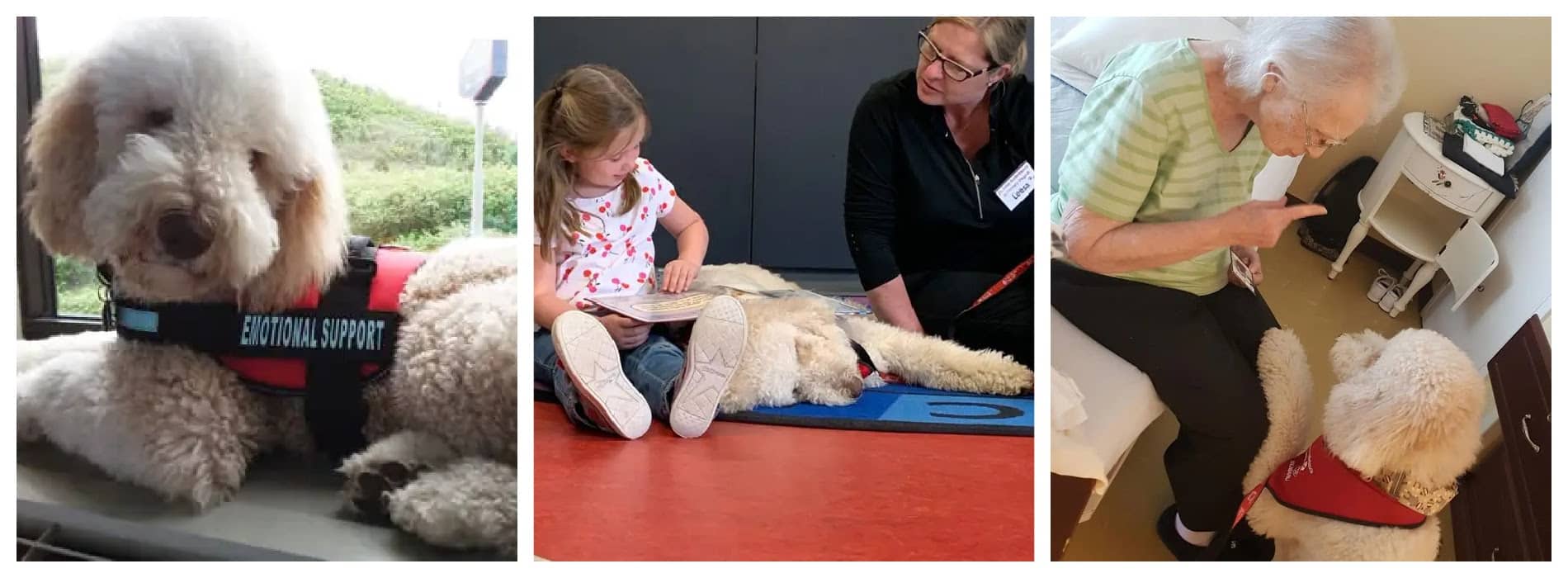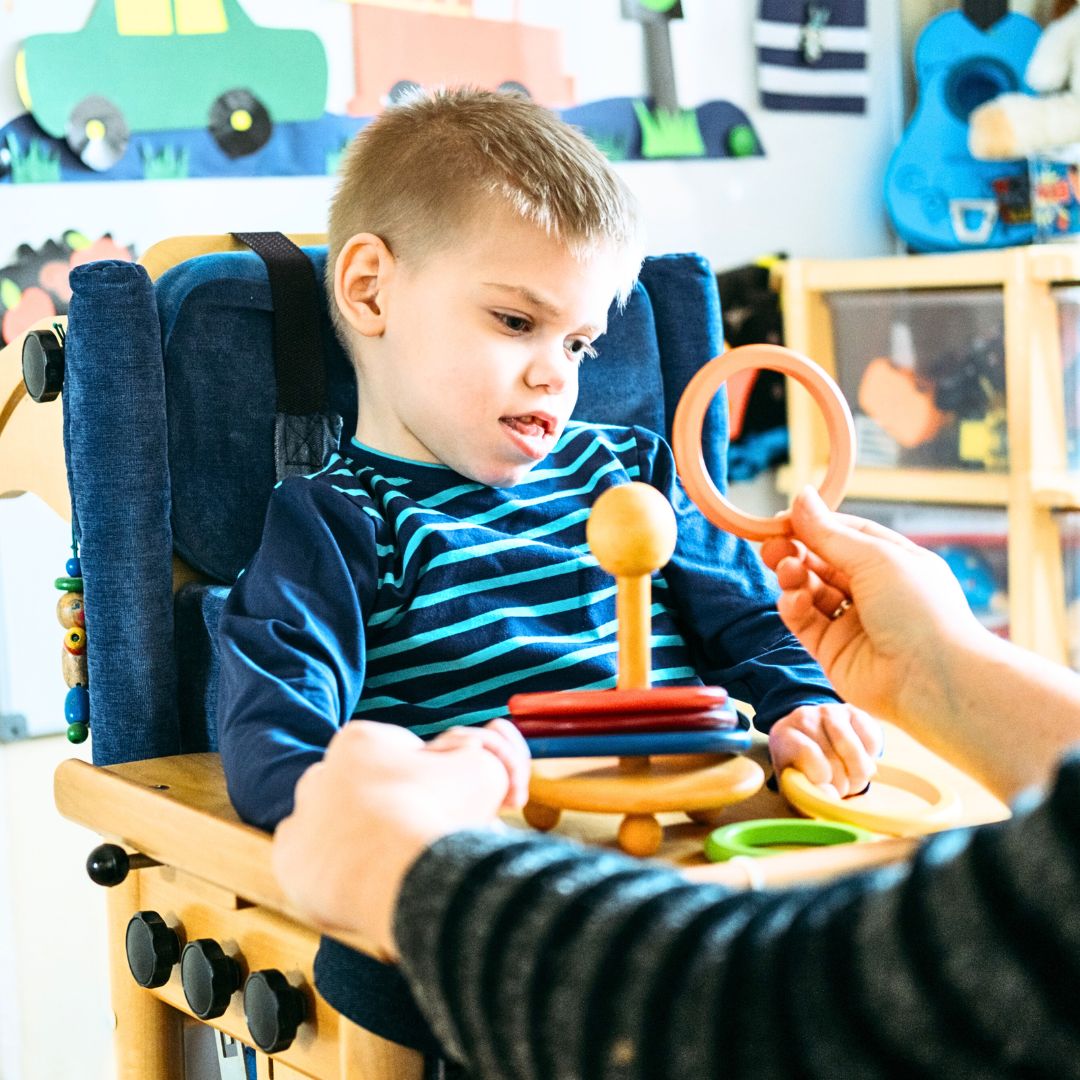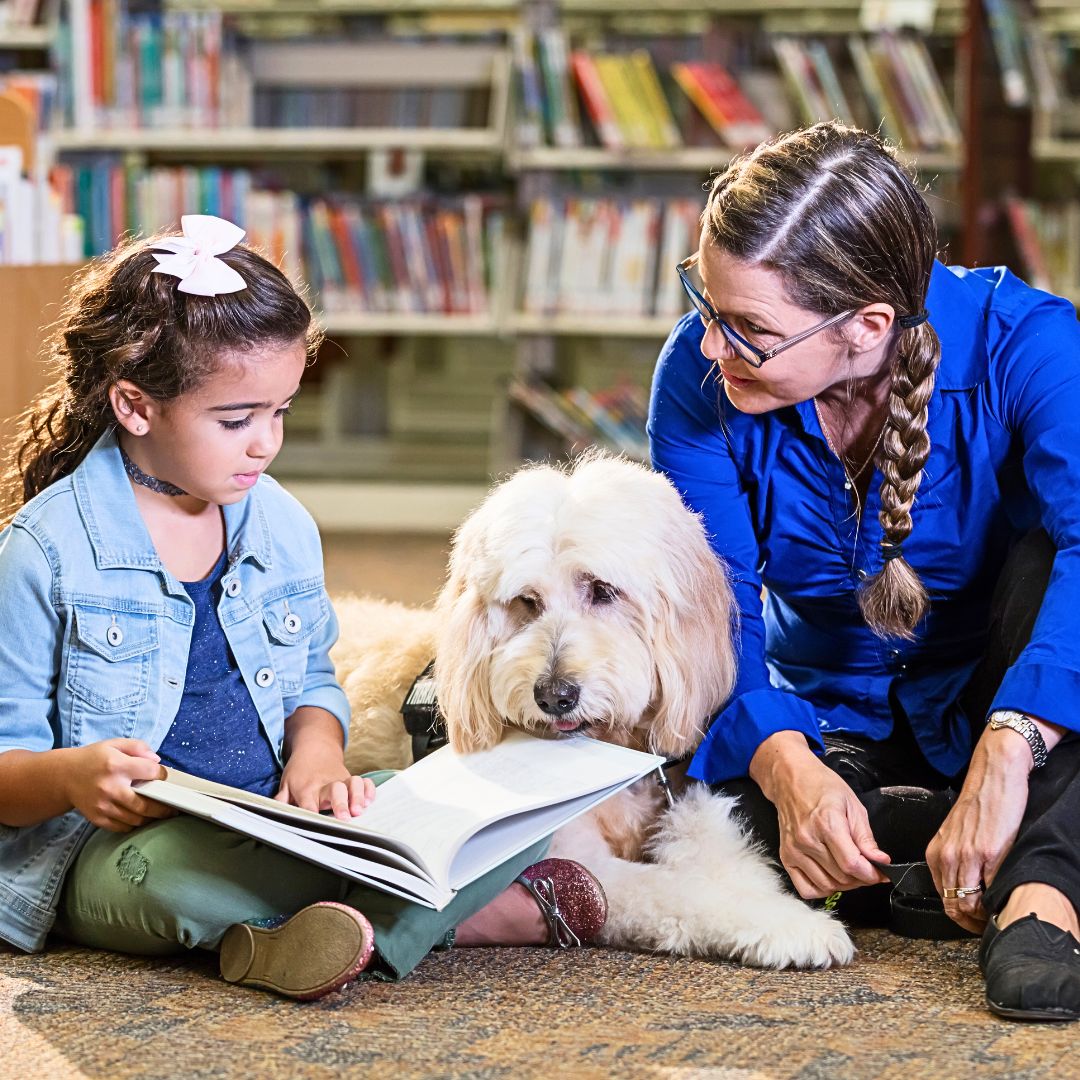Therapeutic Benefits From "CHARLIE"
Therapeutic Benefits Creating Docile, Intelligent, Social Labradoodles with Therapeutic Benefits from “CHARLIE.”

We specialize in Creating Docile, Intelligent, and social labradoodles that offer Therapeutic Benefits. Our Program is known as “CHARLIE, The Labradoodle.”
Cucciolini Doodles is making a difference in the lives of those who could benefit from having a service or emotional support dog. Their commitment to creating docile, intelligent and social puppies ensures that these furry friends can provide comfort and companionship to those in need. By giving these specially trained Labradoodles, Cucciolini is helping bring countless individuals joy and peace of mind.
To Whom It May Concern:
At eight months old, a puppy and a child have the same cognitive ability. Just like children, puppies explore the world around them by putting things that don’t belong in their mouths. It’s an entirely natural behaviour for both humans and canines to do.
They understand what is suitable for my pet to consume and what isn’t. Charlie has informed me that dogs usually cannot control their bladders for periods longer than 1-2 hours, and since they cannot speak, it can be difficult for them to communicate if they need to eliminate.
Please give me enough food early in the day.
Remembering that I must go outside after eating, sleeping, playing, and drinking is crucial. To help me sleep at night calmly, delay giving me a drink of water until after 7 or 8 p.m. Additionally, putting me in a crate can make training much more straightforward for both of us. Of course, accidents can occur, as I’m learning—don’t worry if it happens! Please be patient with me!
They were having fun, running around with their Toys.
I’m an active pup who loves to run around and play all day! My favourite activities include:
Chasing imaginary monsters.
Running after your feet and toes.
Attacking you (in a friendly way) & chasing fuzzy balls.
It’s all just part of being a dog, so don’t be too hard on me. Playing is what we do best, and I want to make the most of it!
All Day, I Look Forward To Having Fun With You.
My playful nature can help both of us remain content and healthy. You can use your experience to entertain me outdoors with activities such as fetching a rolling ball, playing tug-of-war, and giving me chew toys.
If I start nipping too hard, it’s best to communicate with me in “dog language” by barking loudly. It is how dogs speak to each other, and I’d understand the message. If I become too energetic, you can redirect my behaviour by taking a short break from interacting with me or guiding me to my crate with a peanut butter-filled toy.
How To Love and Respect As You Do. Therapeutic Benefits From “CHARLIE”
Animals have complex emotions, and it’s essential to respect them. I value being part of a family and receiving their love in return. I’m ready to give you companionship, unconditional affection, and support. Help me develop properly by treating me with kindness and providing proper guidance.
Everyone Has Their Flaws and Imperfections, You Included.
To properly train me as a puppy, please read up on dog care manuals and look online for resources. It is also beneficial to study my breed and temperament; this knowledge will help you better understand my reactions and behaviour. Finally, it is vital to train me with patience and care. The best method is to participate in training classes with me to help me socialize.
“I’m Determined to make you proud of me one day, Charlie. I Love You.”
“CHARLIE” Offers Companionship, Emotional Support and Therapeutic Benefits for Adults and Children.

A lack of physical activity and adequate rest can result in anxiety and depression. It can lead to lost wages or even the significant financial burden of supporting a lifetime of caregivers.
A Canine Companion’s presence can make our lives better and more meaningful.
Labradoodles are renowned for their loyalty, courage, and unconditional love, which can bring immense joy to people.
Getting an Emotional or Service dog can significantly improve a person’s life with a disability. Potential advantages include higher levels of independence (90%), self-esteem (80%), contentment (80%), and assertiveness (80%).
It’s Truly Incredible What Skills and Abilities Dogs Possess.
People living with disabilities often depend on animals to help them with daily life. Special skills are for those who are visually impaired, deaf, epileptic, or have physical impairments. These skills will help maximize their independence, increase safety, and facilitate greater involvement within the community.
Labradoodles are known to have a healing effect when touched, making them ideal pets for people looking for companionship and comfort.
Animals can provide a unique type of comfort. Those who feel socially and emotionally isolated can easily benefit from the companionship of a therapy dog. This special connection provides emotional healing and helps them communicate more effectively. Animal-assisted therapy can diminish feelings of isolation and create a safe and unconditionally accepted atmosphere.
Loneliness can trigger feelings of sadness or depression.
It’s essential to ensure you get enough social contact and meaningful connections to avoid negative emotions.
Have you ever come across a dog seeking attention? Studies have shown that petting and interacting with dogs can boost serotonin and dopamine levels, reducing depression.
Researchers have shown that humans’ serotonin levels, a hormone that fights depression, rise dramatically after interaction with live animals. With these findings, they hope to make therapy dogs a more medically accepted patient intervention.
CHILDREN WITH AUTISM
Autism and other neurological conditions can be debilitating for young ones, affecting their ability to form healthy relationships & communicate well. Autism can pose significant challenges for children, significantly impacting their daily lives. Fortunately, therapies have shown some success in improving their behaviours. Research has demonstrated that pet ownership can substantially contribute to individuals’ social and cognitive growth. Human and animal interactions may relieve stress in children and reduce the symptoms of Autism.
SENSORY & MOTOR
We are helping individuals with Autism regulate their sensory and motor behaviour. These specially trained dogs can also assist their owners in navigating their surroundings and alert caregivers to any issues. Service dogs can reduce social isolation, attract positive attention and facilitate social interaction.
Dogs are amazing creatures in that they have the natural ability to remember and understand complex routines. It allows owners to easily recall sequences of steps in their daily activities and be more adaptable when unexpected changes arise.
THERAPY DOG QUALITIES

Not all dogs have the capabilities and aptitudes to become therapy dogs. When determining your pet’s ideal situation and any necessary training, it’s essential to consider its personality. It’s also vital to ensure puppies are in loving and positive human contact during their formative weeks.
The Benefits of Having a Labradoodle Companion
Labradoodles have decreased blood pressure, cholesterol, and triglyceride levels while reducing the risk of morbidity and mortality associated with cardiovascular diseases. There’s a clear connection between pet ownership and health; these furry friends are genuinely more than companions—they’re a form of medicine!
What makes Labradoodles suitable as therapy dogs?
Labradoodles can provide tremendous assistance to individuals with disabilities in various ways. Labradoodles are intelligent and highly trainable dogs and are often chosen as service animals due to their hypoallergenic coats and gentle temperaments. Here are some of the ways Labradoodles can help:
Mobility Assistance
Labradoodles can be trained to support individuals with mobility impairments by helping them walk, fetch items, and even operate household devices like opening doors and turning on lights.
Guide Dogs
Labradoodles can serve as guide dogs for individuals who are visually impaired. Their intelligence, intuition, and ability to navigate obstacles make them excellent guides, offering independence and companionship.
Medical Alert
Labradoodles have an exceptional sense of smell that allows them to detect changes in their handler’s body odour or behaviour. They can be trained to alert individuals with conditions such as diabetes, epilepsy, or allergies to potential health crises before they occur.
Emotional Support
Labradoodles are known for their affectionate nature and ability to provide emotional support. They offer comfort and companionship, helping individuals with mental health conditions like anxiety or depression feel more secure and at ease.
Autism Support
Labradoodles can be trained to assist children or adults with autism spectrum disorders by providing comfort during distress, calming, and promoting social interaction.
Allergen-Friendly
Individuals with allergies often prefer Labradoodles due to their hypoallergenic coat. Their low-shedding fur produces fewer allergens, making living comfortably with a dog easier for people with sensitivities.
Socialization
Labradoodles are known for their friendly nature and enjoy human companionship. They are often used to assist individuals with disabilities in improving their social skills by providing opportunities for interaction and companionship. Moreover, Labradoodles are effective conversation starters, making engaging in social situations easier for their handlers.
Therapy Dogs
Labradoodles are friendly and social, making them excellent therapy dogs. Labradoodles offer emotional support and companionship to individuals with many disabilities, helping to reduce stress, anxiety, and depression. Their calm demeanour and non-judgmental presence can positively impact mental well-being.
Studies Conducted
Studies conducted by the AKC have shown that dogs provide numerous health benefits. They can help increase fitness levels, lower stress, and improve overall happiness. Over the past decade, there has been a significant rise in the utilization of service Labradoodle dogs. Labradoodles undergo extensive training to perform specific tasks for individuals with disabilities, using their exceptional capabilities.
Dedication & Loyalty
Labradoodles have shown immense dedication and loyalty in assisting individuals with disabilities across various scenarios. With their unique combination of intelligence, adaptability, and gentle demeanour, they make fantastic companions for those needing support. Labradoodles are often regarded as suitable therapy dogs due to several vital attributes they possess. This trait is essential for therapy dogs to connect with and comfort individuals in need.
Gentle & Patient
Additionally, Labradoodles have a gentle and patient temperament, which is vital when working with people experiencing physical or emotional challenges. They are known to be highly intuitive, capable of sensing and responding to the emotions of those around them, offering a calming presence and reducing stress levels.
Labradoodles possess a winning combination of sociability, patience, intuition, trainability, and hypoallergenic qualities, making them highly suitable as therapy dogs. Their natural ability to connect with individuals and provide comfort makes them invaluable assets in promoting emotional well-being and improving the therapeutic experience.
What are some examples of the therapeutic benefits experienced by children and adults?
There are numerous therapeutic benefits that both children and adults can experience. Here are a few examples:
Emotional Well-being
Therapy benefits people of all ages by helping them gain insight into their emotions and how to manage them effectively. A Labradoodle can offer a secure environment for individuals to openly express their feelings, work through challenging experiences, and cultivate more adaptive coping methods.
Improved Communication Skills
Therapy promotes improved communication and interpersonal skills using Labradoodles, helping children and adults express themselves clearly, listen actively, and build stronger relationships.
Enhanced self-esteem
Dog companionship therapy helps individuals develop a positive self-image by building self-awareness and self-acceptance. It can increase confidence and a greater sense of worth and improve overall well-being.
Stress Reduction
It’s essential to learn effective stress management techniques for dogs to reduce anxiety and enhance their overall quality of life. Techniques such as relaxation exercises, mindfulness, and cognitive-behavioural therapy can benefit our furry friends.
Behaviour Management
Behaviour Management Therapy offers techniques and resources to help individuals alter behavioural patterns that may be impeding personal growth or causing distress. Labradoodles have been found to assist both children and adults in developing healthier habits, enhancing impulse control, and making more informed decisions.
Resilience Building
Developing resilience in dogs through therapy can help them navigate challenges, cope with setbacks, and build problem-solving skills, which can have significant benefits in various aspects of their lives. It’s important to remember that each dog’s therapeutic journey is unique, and the specific benefits can vary based on individual circumstances and goals. Consulting with a qualified veterinarian can help determine the particular advantages of therapy for your dog.
Are there specific training programs available for Labradoodle therapy dogs in Ontario?
Yes, specific training programs are available for Labradoodle therapy dogs in Ontario. Therapy dog training programs focus on preparing dogs to help provide comfort, support, and companionship to individuals in many different settings, such as hospitals, nursing homes, schools, and rehabilitation centers. These programs typically teach dogs basic obedience skills, socialization with diverse groups of people, and specific therapy dog tasks.
Reputable Organizations
In Ontario, you can find reputable organizations that offer therapy dog training programs for Labradoodles. Some popular options include the St. John Ambulance Therapy Dog Program, Therapeutic Paws of Canada, and the Canadian Canine Therapy Corps. These organizations have experienced trainers who can guide you through training your Labradoodle to become a therapy dog.
Ensure your Labradoodle meets the required health and temperament criteria before enrolling in a training program. Additionally, these programs often have specific prerequisites and evaluation processes that you need to fulfill.
How can Labradoodles benefit children and adults with Autism?

Labradoodles can provide numerous benefits for children and adults with Autism, serving as both autism therapy dogs and passionate support companions. Here are a few ways Labradoodles can be advantageous:
Sensory Support
Labradoodles are gentle and non-threatening, ideal for individuals with sensory sensitivities. Their soft fur and soothing presence can help calm the anxiety and overstimulation that often accompany Autism.
Emotional Connection
Labradoodles are known for their intelligence and empathy, which allows them to form strong bonds with their owners. This emotional connection can be particularly helpful for individuals with Autism have difficulty with social interactions. Labradoodles can offer consistent companionship and understanding, making them well-suited to support those with Autism Socialization Aid.
Individuals with Autism encounter difficulties in socializing and building communication skills. Labradoodles, known for their friendly and approachable demeanour, can potentially act as intermediaries between individuals with Autism and others, aiding in fostering social interactions and enhancing communication.
Safety Assistance
Labradoodles can be trained to perform specific tasks that enhance safety for individuals with Autism For example; they can be taught to prevent wandering by acting as a reliable anchor or to provide deep pressure therapy to help alleviate anxiety during meltdowns or sensory overload.
Routine Support
People with Autism often find comfort in routine and predictability. Labradoodles can provide stability by offering a reliable and constant presence, helping to create a structured and predictable environment that supports training and daily routines.
Emotional Regulation
Labradoodles have an innate ability to sense emotions and offer comfort when needed. They can provide emotional support during distress or anxiety, helping individuals with Autism express their feelings more effectively.
It’s crucial to understand that every person is distinct, so the advantages of having a Labradoodle as a companion for someone with Autism may differ depending on their specific needs and preferences. Working closely with professionals in the field of autism therapy can help determine if a Labradoodle is a right fit for a particular individual.
Embracing the Therapeutic Potential of Labradoodles to Improve Lives
These gentle and intelligent dogs have been found to provide numerous benefits as therapy animals, improving the lives of many individuals.
Hypoallergenic Coats
One of the main advantages of labradoodles as therapy animals is their hypoallergenic coat. People with allergies often struggle to find suitable furry companions, but labradoodles offer a solution. Their low-shedding and minimal dander coat makes them ideal for individuals with allergies or asthma, allowing them to experience pet ownership.
Create a Safe Environment
Labradoodles are known for their ability to detect and react to human emotions, offering solace and assistance during difficult periods. Their composed nature and lack of judgment establish a secure and encouraging setting, enabling people to communicate and express themselves openly.
Highly Trainable
These highly trainable dogs strongly desire to help their owners, making them ideal candidates for various therapy tasks. Whether it’s assisting individuals with physical disabilities or participating in animal-assisted therapy programs, labradoodles excel in providing the necessary aid and encouragement.
Reduction in Stress Levels
Furthermore, labradoodles have been found to help reduce stress and anxiety in adults and children. Petting a Labradoodle has been proven to release endorphins, which promote relaxation and improve overall well-being. Labradoodles’ affectionate nature and gentle demeanour create a soothing atmosphere that significantly alleviates stress and anxiety.
Labradoodles are known for their love of children and their ability to form strong bonds with all family members. Having a labradoodle as a therapy animal benefits the individual receiving therapy and enhances the overall well-being of the entire household.
Labradoodles are exceptional therapy animals, offering many benefits to needy individuals. Their hypoallergenic coat, friendly nature, trainability, and stress-reducing qualities make them perfect for those seeking therapeutic support. By embracing the therapeutic potential of labradoodles, we can genuinely improve the lives of many individuals and create a more compassionate and inclusive society.
